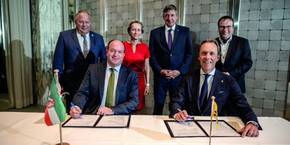Kategorien
Europe’s network of the future
Duisburg and Antwerp enter long-term partnership. Another step has been taken in the field of energy transition, hinterland connections and infrastructure. The inland port of Duisport and the port of Antwerp-Bruges have signed a long-term cooperation agreement. This will further expand European networks.
On 7 September the CEO of the inland port of Duisport, Markus Bangen, and the CEO of the port of Antwerp-Bruges, Jacques Vandermeiren, signed a far-reaching partnership. The Flemish prime minister Jan Jambon and other personalities from the maritime, commercial, political and digitalisation fields were also present.
The core of the agreement consists of expanding cooperation between the two partners in the fields of energy transition, railway and hinterland connections and port infrastructure.
All three fields are of outstanding importance to maintaining reliable supply chains for industry, and to stabilising supply chains between Germany and Belgium, as well as within Europe.
A hydrogen supply chain
The pan-European energy system is set to focus increasingly on sustainable energy sources, with green hydrogen carriers playing a crucial role. Developing solutions to import ‘green’ hydrogen, store and distribute it in various forms, is therefore one of the most important strategic pillars for the new cooperation agreement between the two ports.
The partners overall goal is to build an international supply chain for hydrogen in which they can both develop into central hydrogen hubs for Europe.
To achieve this goal the inland port of Duisport and the maritime port of Antwerp-Bruges have agreed to set up a high-frequency rail shuttle, together with pipeline connections now on the drawing board, in order to establish the railways as a ‘rolling pipeline’.
Sustainable multimodal links
The partners are convinced that expanding the hinterland network, promoting sustainable multimodal transport links and steadily shifting to modes of transport that go easier on the environment are key to realising the energy transition.
Each of the two ports is aiming to achieve climate neutrality by the year 2050. Thus developing port handling equipment that goes easier on the environment is also part of the new deal.
Duisport already signed similar agreements with the ports of Rotterdam and Amsterdam in May and June this year. “One of our major goals in the long term is to substantially strengthen our network of European partners,” Duisport chief executive officer Bangen elaborated.
Vandermeiren, the chief executive officer of the port of Antwerp-Bruges, added that “we have to guarantee European industry reliable and secure access to renewable energy sources if we want to become a climate-neutral continent.
Importing, transmitting and distributing ‘green’ molecules requires short, medium as well as long-term solutions. We’re pleased that ports of Duisport and Antwerp-Bruges have now joined forces to this end.”

